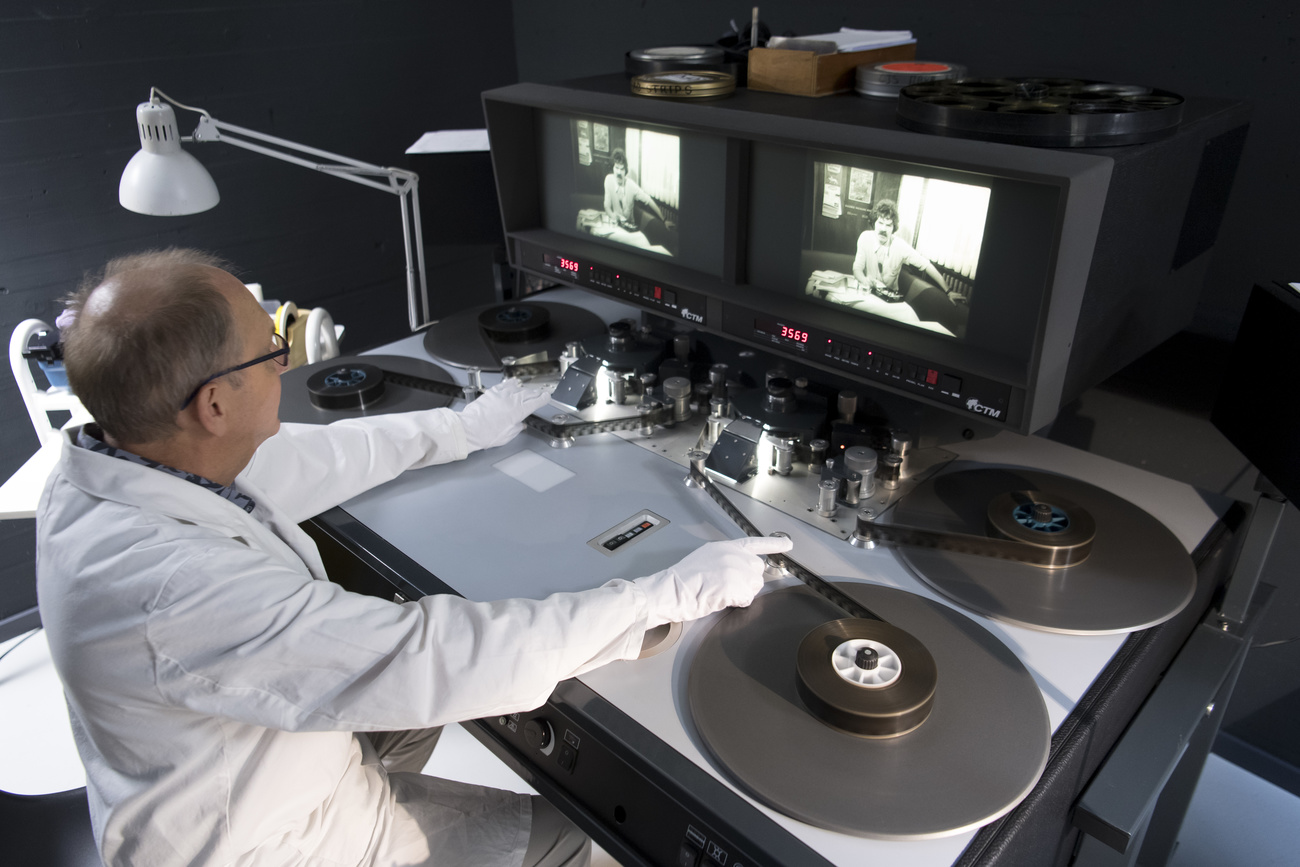Small country, deep pockets: how to make (and fund) films in Switzerland

At this year’s Cannes Film Festival Switzerland was the ‘guest of honour’ of the Marché du Film, the most coveted film market in the world. It showed the money trail to Swiss co-productions and how the country deals with the past and the future of cinema.
There is an enormous, subterranean world beneath the red carpets, celebrities, luxury brands and world premieres staged at the Cannes Film Festival. Literally beneath the iconic red stairs of the Grand Théâtre Lumière, Cannes also hosts the biggest annual gathering of film professionals: the Marché du Film, considered the “heart of the film industry”, is an essential hub for producers, distributors and delegates from festivals and institutions. It’s where many films effectively start – and where they eventually are sold (or not).
The latest edition of the Marché, which ran from May 14 to 22, chose Switzerland as Country of Honour. The Swiss brought a substantial delegation with officials from Swiss Films (the national agency for film promotion), the Swiss Federal Office of Culture, and the Swiss Broadcasting Corporation (SBC) (SWI swissinfo.ch’s parent company).
Considering that Switzerland is a small country with relatively deep pockets, its film industry relies massively on international co-productions. At the Marché, the Swiss had a privileged opportunity to showcase their talents in different fields of film work, help them enlarge their networks, and increase their visibility on an international level – all the while talking the talk that matters here: money.

Where does the money come from?
According to the latest figures, Switzerland produces an average of 80 feature-length films annually, 43% of which are co-productionsExternal link. Participants discussed advantages and inconveniences of the Swiss funding schemes, which may be generous but also differ broadly from region to region.
During an industry panel about film commissions, Zurich Film Fund’s managing director Julia Krättli pointed out that, while the majority of the financing comes from the Federal Office of Culture, followed by the SBC and regional funds, not every regional fund has the same spending obligations.
In fact, the decentralised structure is further reflected in the regional network that groups film commissions. For its 26 cantons, Switzerland only has six film commissions (Ticino Film Commission, Valais Film Commission, Film Commission Zurich, Film Commission Bern, Film Commission Lucerne & Central Switzerland, Film Location Riviera), each with different priorities, offers and economic capacities.
In common, though, they all share the goals of attracting film capital with offers of specialised services and labour for film productions – and convincing politicians to enhance their attractivity with tax concessions, subventions and favourable rules and laws.

Switzerland’s approach to film financing includes a national film investment refund programme (PICS)External link rather than a tax incentive. While tax incentives reduce the amount of taxes a company must pay, a cash rebate system consists of refunding 20% to 40% of its expenses. On a regional level, the Valais Film Commission, launched in 2022, offers its own cash rebate incentive.
This initiative will be followed by Film Commission Zurich, as announced by its managing director Dino Malacarne, who also revealed the inauguration of a production incentive that will offer financial contribution to films shot in the Zurich area. During the same panel, Malacarne emphasised that “if we don’t start working with incentives in Switzerland, then it won’t be possible for us to compete with countries abroad”.
One key takeaway about the co-production opportunities Switzerland presents is their focus on attracting foreign partners and talents to the country, rather than making Swiss films appealing to international audiences.
This domestic focus is also evident in the 4% Film Act, known as Lex Netflix, which came into force in January. The act requires VoD (video on demand) services to invest 4% of their gross income in Swiss productions. According to Julia Krättli, the effective results of this policy are yet to be seen. For now, Netflix has taken on a co-producer role in TV projects such as Winter Palace External linkand Early BirdsExternal link.

Mehr
Will Lex Netflix boost Swiss filmmaking?
Future of the past
Apart from the new audiovisual technologies, Switzerland also excels in the restoration and conservation of film classics, and not just of Swiss cinema.
During an industry panel focusing on heritage films, Giona A. Nazzaro, the artistic director of the Locarno Film Festival, spoke of the festival’s diverse projects that aim to create a continuous dialogue between the cinematic past and present.
“Cinema is a language that is spoken in the present tense”, he said. “If we don’t know what has come before, we can’t have a meaningful conversation about what we want to do tomorrow. Knowing the so-called past is the best way to start shaping the future.”

Mehr
Helping young actors crack the foreign film market
In 2020, Locarno launched an online platform called Heritage Online that connects different catalogues and professionals involved in heritage films. The programme now also has a Heritage Restoration Contest that sponsors the restoration of one of the nominated heritage films.
Joining Nazzaro in the discussion, Frédéric Maire, the head of the Cinémathèque Suisse, highlighted that their main goal is to make audiences discover heritage films and Swiss cinema. Maire drew attention to the two biggest issues they face regarding restoration in the Swiss context.
He pointed out that international co-productions are not a recent trend in Switzerland. This business model has been used for many decades, so his challenge is to recuperate good copies with elements that couldn’t be found in Switzerland but exist in the co-producing countries.
In fact, the Cinémathèque engages in nearly “archaeological” research to find the correct rights owners – a consequence, according to Maire, of the fact that Switzerland was very late in establishing standard procedures to index its own productions.
But the public investment in the Cinémathèque in the past 20 years signals a strong commitment to making up for the time lost: the institution is among the ten most important film archives in the world, and its facilities are a benchmark in the field. It was certainly one of the strongest Swiss cards at the Marché du Film in Cannes.

Mehr
The Cinémathèque Suisse turns 75, and film lovers can rejoice
Discreet innovators
The Swiss delegation to Cannes highlighted the most recent Global Innovation Index where Switzerland has kept the pole positionExternal link for 14 consecutive years. It set up a “Swiss Hub” in the Marché, where Swiss start-ups specialising in AI, spatial technologies and multi-sensory experiences could present their products and services.
Virtual Switzerland’s managing director Laetitia Bochud explained that “R&D is one of the reasons why there is so much going on in Switzerland. We can compete with tech giants but always very humbly. So perhaps you might not notice”.

This year Switzerland had three features and one short in the Official Selection:
– Konstantin Bojanov’s The Shameless took the Best Actress Award for Anasuya Sengupta in the parallel competition Un Certain Regard.
– Swiss-French actress Laetitia Dosch’s debut film Le Procès du Chien also featured in the Un Certain Regard section, taking home the Palm Dog Award for best dog performer.
– Swiss animator Claude Barras had the world premiere for his film Savages in the Special Screenings, and Elena López Riera’s Queer Palm for Best Short winner Las Novias del Sur also had its premiere in the section Semaine de la Critique.
Edited by Virginie Mangin and Eduardo Simantob/ts

In compliance with the JTI standards
More: SWI swissinfo.ch certified by the Journalism Trust Initiative








You can find an overview of ongoing debates with our journalists here . Please join us!
If you want to start a conversation about a topic raised in this article or want to report factual errors, email us at [email protected].